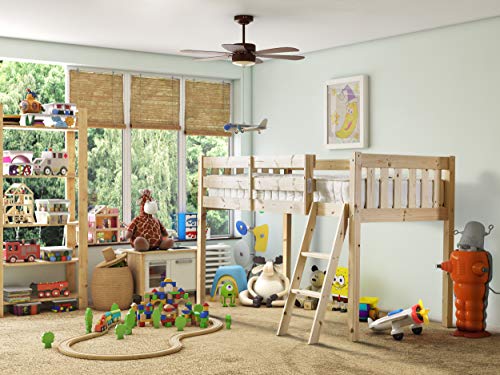Are Kids Ready For Bunk Beds?
Bunk beds are the ideal solution for kids’ rooms. They can be used to study space or playroom during the daytime.
If your kids are ready to move to bunk beds You’ll have to determine their maturity and dexterity. It is also important to look at their sleeping patterns.
Age of Transition from the Top Bunk
The age at when children are ready for bunk beds can differ greatly. The majority of experts advise that children not sleep on the top bunk before they reach the age of six. This is because children under six years old are likely to lack the dexterity and maturity required to safely navigate the ladder. They may also have difficulty understanding and complying with safety regulations for example, not jumping off the top bed or climbing on the guardrails.
It’s also important to take into consideration the level of raunchy your child is when determining if they are ready for bunk beds. Children who tend to be rough or disobey the rules shouldn’t be using bunk beds since they could cause serious accidents. Additionally, children who are at risk of falling out of bed or are particularly tall may not be able safely use the top bunk even if they are six years older.
As kids get older, they may also outgrow their bunk beds. In this situation it’s best for them to switch to a traditional bed so they can sleep more comfortably and with more space. It can be as simple as switching to twin-sized beds, or as difficult as acquiring a fun treehouse bunk like the Mathy by Bols bunk bed which can be transformed into the size of a full-size bed.
It’s best to begin at the bottom bunk then work your way upwards. By doing this, you can ensure that your child is mentally and physically prepared for the transition. This will prevent them from becoming discouraged if they do not immediately get the chance to move to the top bunk.
It’s also an excellent idea for parents to teach their children the importance of following the safety rules no matter where they sleep. This includes teaching children not to jump off the bunk, not to hang objects from the rails, and to use the ladder correctly.
Safety Considerations
Bunk beds can be an excellent sleeping solution for kids, but it’s important to be aware of the dangers to safety. By understanding the risks, observing the instructions for assembly provided by the manufacturer and implementing a few other security measures to ensure that your children have fun in their bunk beds enjoyment without risk.
One of the most significant dangers to safety is the ladder, which could be used for climbing to or from the top bunk. If left unsupervised, children can use the ladder as a fun thing, which can lead to dangerous consequences. Ladders that have not been properly secured can fall off the side of the bunk bed, which could cause children to be pinned under, result in fatal head injuries. Children may also fall off the ladder and lose their balance while attempting to climb, resulting in a fall.
To reduce the risk, teach your child to only make use of the stepladder for climbing up and down the ladder, and not to be used as a game. A night light or another form of lighting near the ladder is also an excellent idea. This will help children to see their steps through the dark, and also prevent them from falling over furniture or toys in the room.
Safety considerations include making sure the mattress fits the bunk bed frame properly, ensuring that the bed is away from windows, blinds, ceiling fans and cords and making sure there are no sharp edges on the ladder or bunks. It is also important to prohibit rough playing and horseplay on the bunks as this can lead to structural damage and injuries.
Before letting your children into the bunks, ensure that there aren’t loose bolts or weak spots or danger zones. Also make sure there aren’t any gaps or openings in the safety railing, headboard or ladder that could allow a child’s head or limbs to become wedged in. These gaps should be no larger than 3.5 inches. In accordance with safety standards, you should also make sure that the guardrails on either side of the top bunk are at least 5 inches over the mattress.
How to Choose the Right Bunk Bed
Bunk beds can create an enjoyable and social environment to rooms for kids, and there are many choices to choose from. You can make the most of space and accommodate a range of sleeping preferences and needs by choosing the ideal bunk bed layout.
To aid you in the process of choosing a bunk bed begin by looking through a wide variety of finishes and materials to find the ideal bed for your children’s bedroom design. Think about the style of the footboards and headboards aswell as your preference for slats or solid panels or bent bed ends. Choose kids bunk beds and finish that is the best match for your home’s existing decor while standing against the changes of time and fashion.
Then, you can decide if would like the bunk beds equipped with a ladder, angled ladder, or a staircase. Each provide unique safety and advantages. Ladders, angled ladders, and staircases are all options that will make space but are difficult for younger children to climb.
Standard bunk beds are two twin beds that are stacked perpendicularly on top of one other, with a ladder or staircase to reach the top. You could consider a loft bed with space beneath for storage or a desk. These beds can accommodate a full-size mattress at the bottom, and a twin-size on the top. This gives you a flexible sleeping option for rooms shared by a couple or in holiday homes.
It’s time to shop for the bunk bed that is the best fit for your family. Check out the options at furniture stores, home improvement centers and online retailers to find a bunk bed that meets your kids’ needs.
Be attentive to the frame material when choosing a bunkbed. It is crucial to ensure your child’s safety and comfort. Avoid cheap, low-quality materials that may sag quickly or break. Additionally, you should choose solid woods instead of particle boards made of smaller wood flakes glued together, as they are more durable and offer greater stability.
Getting Started
There’s a point in the lives of most kids where they absolutely love the idea of bunk beds. They are the perfect solution to rivalry between siblings over who sleeps in the top bunk, and it’s a great way to accommodate more than one child in a tiny space. Bunks can also be a great and practical way to entertain friends for sleepovers without having to purchase extra bedding.

There are a few things you need to consider when selecting the ideal bunk beds for your family. Be sure that your children will be able to move into and out of the top bunk safely and comfortably. This is especially crucial for children who are more prone to sleepwalking, or who have difficulty staying from rolling over the bed’s side. If they cannot do it easily then a ladder could be the best option.
The overall style and look of the bunk bed is important. You’ll want to ensure that it is in line with the style of your bedroom and that your kids enjoy it. Bunks are available in a variety of styles from traditional to contemporary. They can be constructed from different materials, like pine or MDF based on your personal preferences.
If you’re building your bunk bed yourself it’s a good idea to make an inventory of all the tools that you will require and ensure that you have them all before starting. This will avoid any disappointments such as realising that you’ve misplaced a screw halfway through the build.
You can make your bunk bed more appealing to your kids by being creative. There are lots of fun and exciting accessories available to choose from like themed bed tents that transform the top bunk into a castle or fort and the perfect place for them to play all day (and all night! ).
You’ll need to remind your children to put their toys away when they have finished playing. You can keep your child’s bedroom neat and tidy by using bunk beds that have storage built in.
Business Hours
| Open | Close | ||
|---|---|---|---|
| Monday | Open (24 Hours) | ||
| Tuesday | Open (24 Hours) | ||
| Wednesday | Open (24 Hours) | ||
| Thursday | Open (24 Hours) | ||
| Friday | Open Today (24 Hours) | ||
| Saturday | Open (24 Hours) | ||
| Sunday | Open (24 Hours) | ||


Leave feedback about this